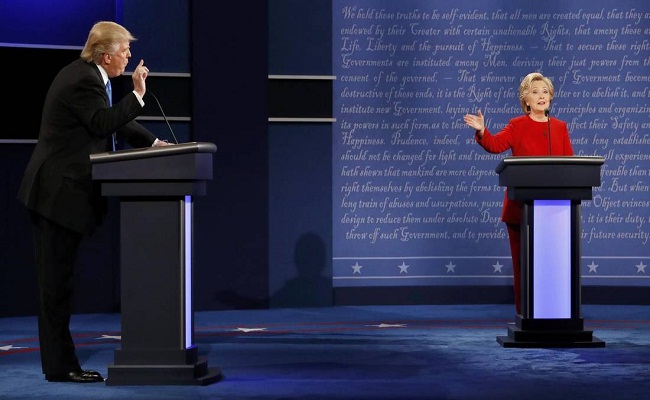Reuters photo
By
Tom Arms
Free Trade has its upside and its downside. It is also emerging as one of the top issues in the Trump-Clinton tussle. The Donald is ‘agin’ it and Hillary is ‘fer’ it.
Their battle is mirrored elsewhere in the developed world. Across the globe, socially conservative populist figures are banging heads with establishment-type realpolitik politicians trying to push and drag their electorates out of the industrial and into the technical revolution.
Lined up behind the opposing forces are powerful trade union interests struggling to save their members’ jobs, while opposing them are computer nerds and financiers pushing for more and bigger technological advances, cost savings and profits.
So what are the upsides and downsides of free trade, aka globalization? The upside quite simply is cheaper goods. The downside is the loss or export of jobs in traditional industries.
Thomas Friedman, in his best seller “The World is Flat,” makes it abundantly clear that without free trade retailing giant Wal-Mart would be unable to implement its winning policy of stack ‘em high and sell ‘em cheap. Its success is built on the foundation stone of purchasing large quantities direct from manufacturers in countries where unions are weak, labour is cheap and raw materials are close at hand.
Neighbouring Mexico has become a particularly powerful and enticing magnet for American manufacturers. According to the Council on Foreign Relations, in the 22 years since NAFTA was founded, US investment in Mexico has soared from $15 billion a year to $100 billion. Dean Baker at the Economic Policy Institute says that this has resulted in the loss of 600,000 jobs and those that are left suffer wage stagnation in order to compete with cheap Mexican labour. Of course, we mustn’t forget China, according to the left-leaning Economic Policy Institute, 3.2 million American jobs were exported to China in the 12 years after it joined the World Trade Organisation in 2001.
These dark clouds do have silver linings—according to the Pew Research Centre, the jobs created in Mexico last year pulled more than 140,000 Mexicans out of the US and back to their homeland. Trump’s wall could become redundant if American investment in Mexico continues.
The other silver lining is that the US has enjoyed more than two decades of low prices. Inflation during the NAFTA years has averaged three percent and the current unemployment figure of 4.9% is almost a full percentage point lower than the postwar average.
Wait a minute, something is wrong here. The figures aren’t adding up. How can America lose 600,000 jobs to Mexico and millions more to China and still have low unemployment levels? The answer is the tech sector. In 2012 alone, 3,961,730 jobs were created in the technology sector. And a lot of these jobs are dependent on the development, expansion and maintenance of a global economy based on free trade.
When an economy shifts from one foundation to the next there is inevitable dislocation. Look at Britain in the early nineteenth century when the Luddites rampaged through the newly industrialised cities smashing the steam-powered textile machinery that threatened their livelihoods. They failed and for 100 years Britain was the most powerful and prosperous country in the world.
British workers were retrained and redeployed in new industries. To do this, the British developed the world’s finest educational establishments. It still has world-class universities and schools which play a major role in keeping the UK economy near the top of the list. Right alongside is American education—an enormous asset with the potential to retrain tens of millions in the 21st century’s well-paid, high-value, high-tech industries that will inevitably replace the over-protected industrial society of the twentieth century.
Tom Arms is a broadcaster and writer focused on world affairs. His compendium of radio broadcasts can be heard at www.lookaheadnews.com. Tom is available for speaking engagements and can be contacted at [email protected].
LookAhead Radio World Report for week commencing 3 October:



No Comments Yet!
You can be first to comment this post!